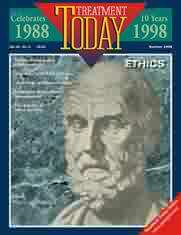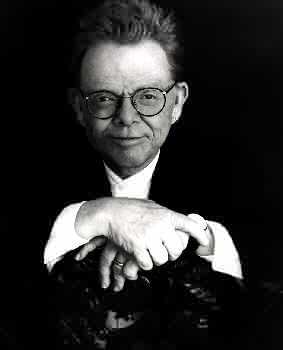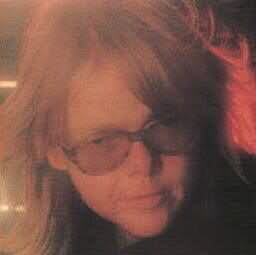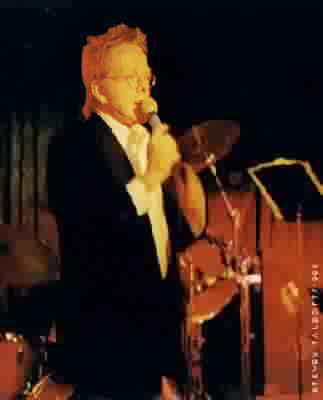TREATMENT TODAY INTERVIEW WITH PAUL WILLIAMS - SUMMER 1998
Last Updated 14th September 1998
(When you click on the red/green below you will be taken to a page with more detailed information.If click on the song titles mentioned, you will be taken to a list of Paul Williams albums/singles/TV shows where that song appears.)
The following is an an interview with Paul Williams, by Tracee Flowers and Chesle H. Blair of Treatment Today, on 17th June 1998

You can find out more about 'Treatment Today' on its own Web page by clicking here. It is published be 'Quest Publishing Co.' - 'A trusted resource in the behavioral health and addiction treatment fields covering alcoholism, drug and other addictions, eating disorders, obsessive-compulsive disorder, and other personality disorders'.
"Our life is a garden, recovery's the gate. This little garden that I walk in has a lot of garbage, and if I walk along and look at it, most of it has my initials on it. So I've learned how not to make new garbage, and how to clean it up quickly if I do"
Paul Williams
 In the 1970s Paul Williams wrote famous songs that entertained the
world, performed by artists such as Barbra Streisand, Three Dog
Night, The Carpenters and Kenny Loggins. Williams also wrote scores
for several films including Rocky IV, Ishtar and 'Muppet Movie' for
which he won a Grammy for the song 'Rainbow Connection' (click here for the lyrics of this song).
Other honors include an Oscar for the song 'Evergreen' (click here for the lyrics of this song) co-written by
Barbra Streisand. Williams is also known for his acting in the film
Smokey and the Bandit.
In the 1970s Paul Williams wrote famous songs that entertained the
world, performed by artists such as Barbra Streisand, Three Dog
Night, The Carpenters and Kenny Loggins. Williams also wrote scores
for several films including Rocky IV, Ishtar and 'Muppet Movie' for
which he won a Grammy for the song 'Rainbow Connection' (click here for the lyrics of this song).
Other honors include an Oscar for the song 'Evergreen' (click here for the lyrics of this song) co-written by
Barbra Streisand. Williams is also known for his acting in the film
Smokey and the Bandit.
He is a gifted composer, lyricist, singer, actor
and humanitarian. In a recent interview with Treatment Today,
Williams discussed his battle with alcohol and drugs through the 80s
and how he overcame his demons.

"I started drinking when I was 14 or 15," Paul Williams said, recalling
his first memory of alcohol as a teenager.
"Alcohol was always around
the house. My father was in construction, and we moved constantly. He always talked about
never missing a day of work because of his drinking." Only years later did it occur to
Williams that maybe his father didn't miss going to work, but he missed conscious
behavior, and so many elements of being a father.
As Williams grew older he tried cocaine.
"Cocaine made me feel like I could shoot
basketball for money. It was the perfect drug to feed my grandiosity," he said.
"Alcohol
made me feel big enough to deal with the rest of the world. My behavior was alcoholic
long before my ingestion of alcohol would prove me an alcoholic." 
Williams, like a lot of
alcoholics, had a basic terror, and alcohol and drugs became the medication to treat his
fear. This fear would later lead him to recovery.
"I know that addiction is a matter of use, abuse and then addiction," Williams said. When
he started writing in his late 20s and 30s, there was a point when he felt the talent was not
in him, but in the stuff (drugs and alcohol).
"Maybe on some weird level I thought, 'As long
as the talent's in this stuff and not in me, then I'm not going to run out of it. I'm always going
to get more stuff,' " Williams said.
"What was interesting was coming face-to-face with it in
sobriety, and dealing with writing without it. And it was terrifying at first," he said. It was
not easy for him to get treatment. His "saving grace" came by way of a young lady who
helped him realize his problem.
Divine Intervention
A 22-year-old "psych" major was the first person who, according to Williams, had the
audacity to tell him that she thought he was an addict.
"She was the love affair of my life,
and I wanted desperately to keep her. So I did what I think a lot of alcoholics do: I told her
I was sober, and I continued to use. After she would go to bed, I would sneak out the puppy
door and score more drugs."

Williams uses the metaphor of a squeaking door to relate how
an addict thinks:
"A normal person would have oiled the front door. But I thought, if I oil
that front door, she's going to suspect something's wrong."
The relationship did not last, and Paul found himself alone with his drugs and alcohol. The
divine intervention was to come in a phone call.
"The interesting thing is that I made the
phone call to a psychiatrist during a black out. I had no recollection of it at all. It was like
divine intervention. At that point, I think I was just so sick and tired of being sick and tired
that I agreed to do it," Williams recalled.
"It was the greatest gift I could have given
myself."
"The most astounding moment in my recovery -- a moment I'll never forget -- is when I sat
down to write my first step. It was the first time I ever prayed about my own recovery. I
asked God to let me see what I needed to see. I was so afraid that I'd get out of the hospital
and I'd just go back to sneaking out the puppy door," Williams said.
"There's an expression
in recovery: 'You can't save your ass and your face at the same time.' It's one of the great
things I needed to learn."
Educating/Counseling
Recovery changed Williams' life and made him realize that his greatest successes came
when he was passionate about something -- and he got really passionate about recovery.

"A
drink to me was like looking through the wrong end of the binoculars. And I'm not looking
at life through the wrong end of the binoculars anymore," Williams said.
"It's wonderful
when you realize that alcoholism is a disease of self, and service is the natural antidote to
that disease." Buddy Arnold, founder of MAP (Musicians Assistance Program), said to
Williams,
"You have a natural feel for this, why don't you go to UCLA. The class is two
nights a week. It'll take a year of your life, and I think you'd get a lot out of it."
Williams
immediately knew it was the right thing to do. He received his drug and alcohol counselor
certificate at UCLA.
"The 12-step process taught me to look upon my disease, my addiction and my alcoholism
as a gift," Williams said.
"I had walked away from this accident, this life-threatening
disease with a bunch of tools for recovery, a bunch of information about how to live my life
that I could share. It was a great way to begin to integrate back into society."

After
treatment Williams eventually began to hear and feel strongly about music again. He fell in
love, and started to acquire some skills as a father.
"One of the benefits of my own
recovery is I became a river to my people in my own family," Williams said.
"My daughter,
at age 6, was saying things about her brother like -- 'I think Cole's really getting in touch
with his anger'. So the trickle-down effect of this healing process is immediate."
Paul Williams was recently appointed to the NCADD (National Council on Alcoholism
and Drug Dependence) Board of Directors.
"My role in NCADD is basically to deal with
recovery issues as they come up. What I feel like I'm able to do -- without becoming the
poster child of recovery -- is when I'm asked to speak publicly about my recovery, I make a
contribution toward ending the stigma about recovery."

Williams' concern now is with the
lack of availability for treatment due to managed healthcare.
"That's why MAP is so
important, because even if you have the proper insurance, it's hard to get a full 28-day
treatment," Williams said.
Another of Williams' concerns is the "romanticizing" of addiction on television.
"I think
someone has to point out that a rock star or a motion picture actor is no different than a
bored homemaker in Peoria, Ill., drinking Listerine. They're both self-medicating. We need
to stop romanticizing," Williams said.
A couple of programs like NCADD, are moving
forward with offering addiction training for physicians. Williams believes,
"We need to
educate: Educate the caregivers already there."
Passion for Recovery
Other than alcoholism education, music is a huge part of Williams' life today. He is still
passionate about music; but instead of sitting at the piano for two days and nights, he'll sit
there for two or three hours everyday.

"I have some balance in my life. The gate that I
walked through to my life is my recovery -- there's nothing more important." Williams can
now say,
"I have a life because of it and it touches every element of it. Recovery is running
almost everything I do in my life."
"It's just great to be a beginner at this stage of my life," Williams said. "I'm eight years
sober, and I wouldn't trade my last eight years for my hottest years in the 70s. Since I got
sober my name has not been on the headlines of Variety, but neither has my name been in
the obituaries."
Copyright 1998 Quest Publishing Company Inc. All rights reserved.
To find out more about Paul Williams work on behalf of the 'Musician's Assistance Program' click here. To find out more about the 'Musician's Assistance Program' click where Paul is a member of the treatment team, co-facilitates a number of MAP's counseling and aftercare sessions and is on the 'Board Of Directors' here. Thank you to David Edwards of Treatment Today for giving me permission to reproduce this interview on these pages.
(Thanks to Sarah for telling me about this interview.)
Email me, David Chamberlayne, at:
Background image by



 In the 1970s Paul Williams wrote famous songs that entertained the
world, performed by artists such as Barbra Streisand, Three Dog
Night, The Carpenters and Kenny Loggins. Williams also wrote scores
for several films including Rocky IV, Ishtar and 'Muppet Movie' for
which he won a Grammy for the song 'Rainbow Connection' (click here for the lyrics of this song).
Other honors include an Oscar for the song 'Evergreen' (click here for the lyrics of this song) co-written by
Barbra Streisand. Williams is also known for his acting in the film
Smokey and the Bandit.
In the 1970s Paul Williams wrote famous songs that entertained the
world, performed by artists such as Barbra Streisand, Three Dog
Night, The Carpenters and Kenny Loggins. Williams also wrote scores
for several films including Rocky IV, Ishtar and 'Muppet Movie' for
which he won a Grammy for the song 'Rainbow Connection' (click here for the lyrics of this song).
Other honors include an Oscar for the song 'Evergreen' (click here for the lyrics of this song) co-written by
Barbra Streisand. Williams is also known for his acting in the film
Smokey and the Bandit.






 Return to Paul Williams' Music and Acting Home Page
Return to Paul Williams' Music and Acting Home Page